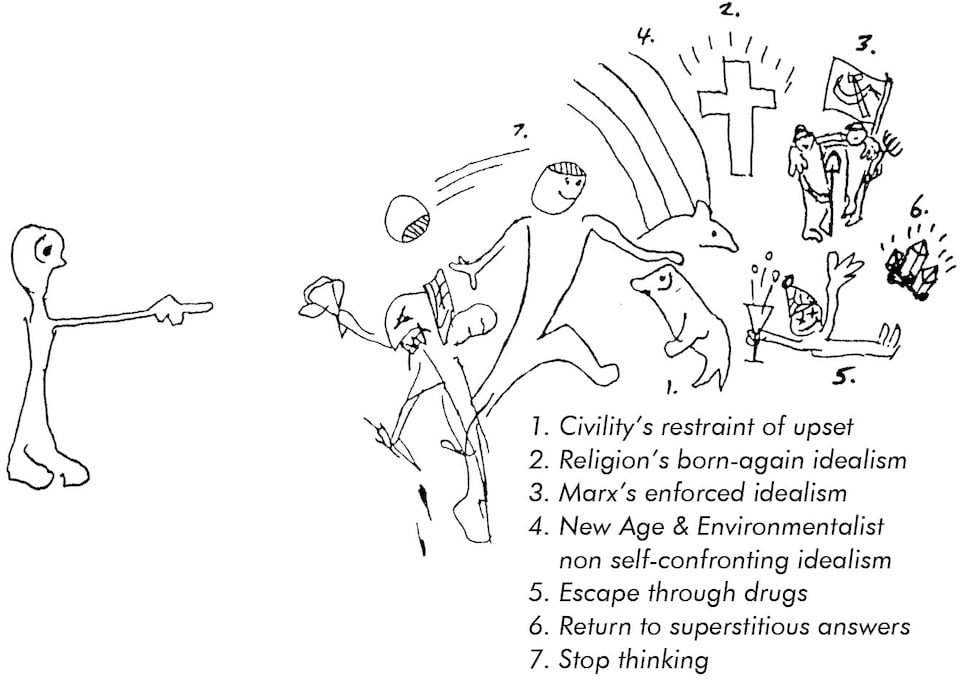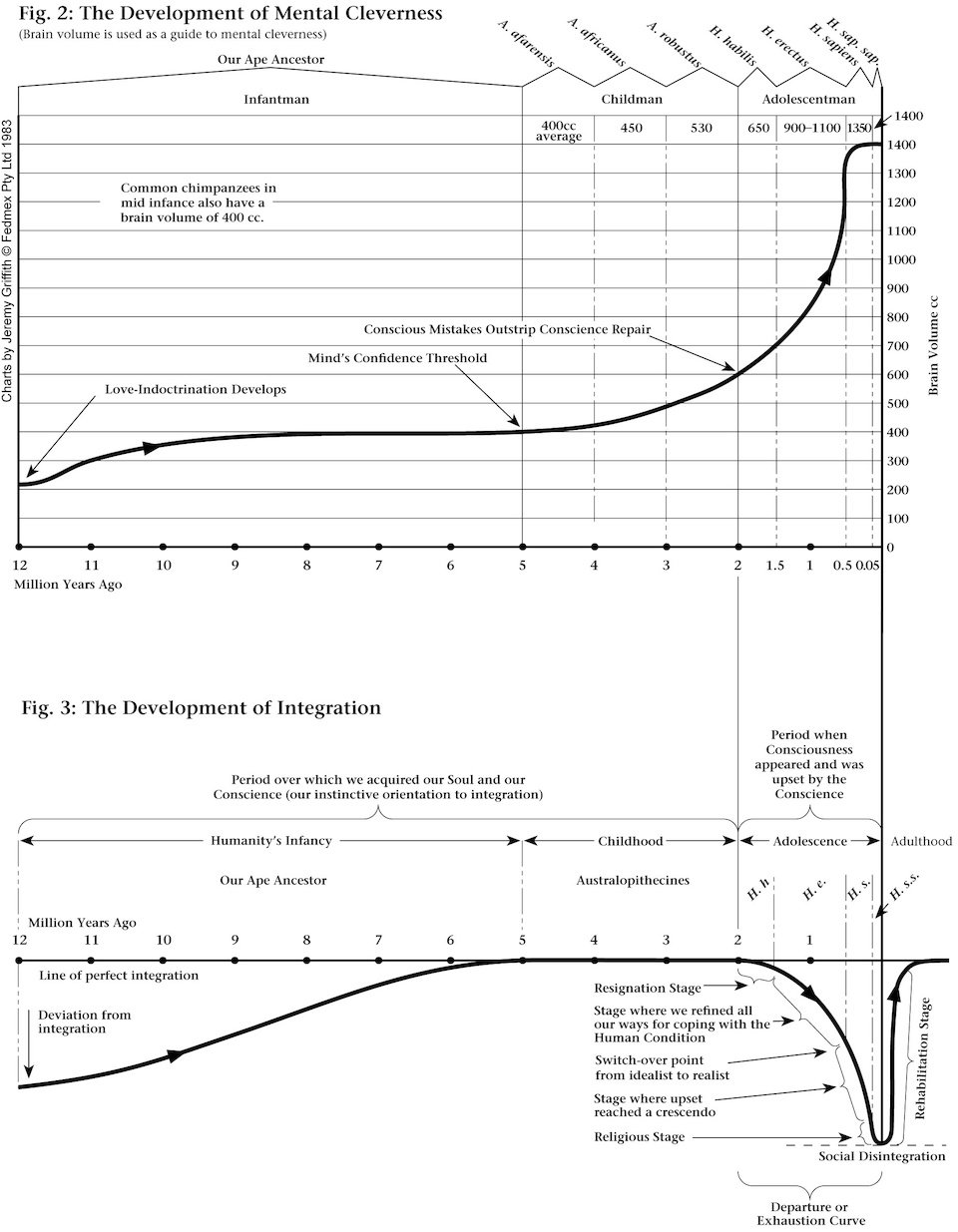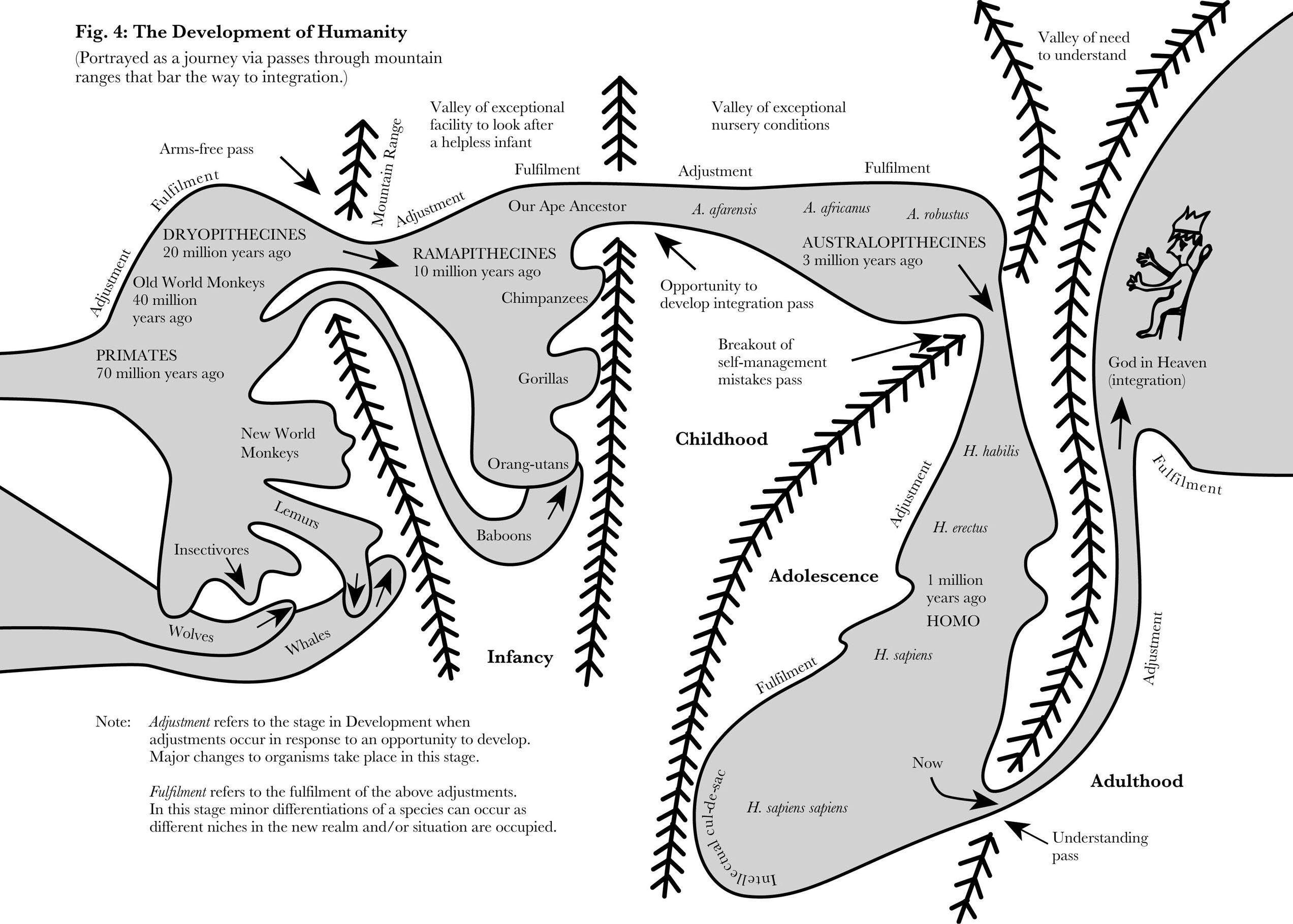Beyond The Human Condition
Page 152 of
Print Edition Stage 4
Abandon the Battle and
Transcend our Upset

Drawing by Jeremy Griffith © Fedmex Pty Ltd 1991
Our Forties (the individual)
Sophisticated Adolescentman
— Homo sapiens sapiens (the species)
The price of searching for knowledge was that we became upset. We became angry, egocentric and alienated.
I should explain that our alienation developed on two fronts; the separation of our intellect from the truth, which was our neurosis or oppression of our intellect, and the separation of our intellect from our soul, which was our psychosis or repression of our soul. We stopped thinking and repressed our sensitive instinctive self. We died in both intellect and soul.
Page 153 of
Print Edition To explain our neurosis, we stopped thinking because it confronted us with the integrative ideals that we couldn’t mentally defend ourselves against. Deep, truthful, profound thinking led our mind into depression. To avoid the depression our thinking became increasingly superficial or escapist.
Thinking can get you into terrible downwards spirals of doubt.
Rod Quantock, Sayings Of The Week, Sydney Morning Herald, July 5, 1986.
To explain our psychosis, we repressed our soul because it reminded us of the unjustly condemning integrative ideals.
Alienation was a wretched state. It was a life of darkness, a living hell.
. . . banished . . . from the Garden of Eden . . . hidden from your presence . . . a restless wanderer on the earth.
The Bible, Genesis 3:23,4:14,12.
Genghis Khan lived in extreme upset. He lived out his anger, egocentricity and alienation to the full. Every day he satisfied his anger with bloodletting, his egocentricity by domination of others and his mind or spirit by blocking out any feeling of guilt. There would have been no peace in his life; no freedom for his troubled spirit.
So what could we do when we’d become unbearably upset but still hadn’t found the answers that would free us from criticism? Only abandon the search and try to return to the world of our soul and its idealism.
But first we civilised our upset. We restrained and contained the expressions of our upset rather than stop the search. However, as upset increased, we eventually had to abandon the search.
The first form of abandonment was religion, through which we could be ‘born (to the ideals) again’. The beauty of religion was that while we personally had abandoned the battle, it continued through the innocence of the prophetPage 154 of
Print Edition our religion was founded around. The task of confronting ignorance continued through the support we gave his soundness. Carl Jung was fond of saying the Christian symbol is a living being that carries the seeds of further development within itself and in Christianity the voice of God can still be heard (The Undiscovered Self: Present and Future, 1961).
But by retaining a presence of innocence, religion reminded us of our loss of it, accentuating our sense of guilt. The more upset we became the more intolerable any implication of guilt or badness became, since we knew the greater truth was that we were not guilty or bad. Therefore the greater our exhaustion or upset the more we needed forms of idealism to support that didn’t remind us of our lack of innocence. Less self-confronting, more guilt-free forms were needed. But this meant less acknowledgement of the truth of our lack of soundness. The trend was towards greater sophistication in evasion or superficiality or alienation.
Following religion came socialism and communism, which imposed social or communal (integrative) ideals and oppressed freedom to search for understanding, but unlike religion didn’t maintain recognition of the world of soundness or soul. There was no element of faith that there were some who could confront the truth. The attraction was that we could support and have the ideals without confronting self, which means socialism and communism were more sophisticated than religion in their degree of evasion or superficiality.
Most recently, the New Age Movement developed. It advocated that we adopt positive thoughts about ourselves — learn to rise above or ‘transcend’ our real but insecure and upset selves. In socialism, while there was no confrontation with our upset selves there was still acknowledgement of the cooperative or integrative ideals. In the ‘human potential’ stressing New Age Movement all the emphasis was on self-affirmation. The depressing integrative ideals and our upsetPage 155 of
Print Edition soulless side were overlooked in favour of just holding onto the greater truth that we are good. Complete superficiality had arrived. All negatives were removed. The New Age Movement signalled the arrival of total alienation (self-deception or dishonesty). It was the ultimate sophistication in evasion. The truth is it was leading us not to a new age of freedom from upset but to the ultimate alienated state!
The capacity for transcendence brings with it a liability to alienation, and the wish to escape this condition . . . can lead to even greater absurdity.
Thomas Nagel, The View From Nowhere, 1986.
Abandoning the upsetting search for understanding and the self-confrontation involved could contain and temporarily heal our upset, but it could not and did not win the battle. Our real freedom from upset depended on finding the understanding of our greater goodness that would end our insecurity. To be genuinely free of upset we had to confront and overthrow ignorance. Ultimately we had to succeed at thinking and vindicate the intellect, not throw it away. The purpose of a conscious mind was to understand, and the responsibility of having a conscious mind was to achieve that understanding.
. . . I am infinitely saddened to find myself suddenly surrounded in the west by a sense of terrible loss of nerve, a retreat from knowledge into — into what? Into Zen Buddhism; into falsely profound questions about, Are we not really just animals at bottom; into extra-sensory perception and mystery. They do not lie along the line of what we are now able to know if we devote ourselves to it: an understanding of man himself. We are nature’s unique experiment to make the rational intelligence prove itself sounder than the reflex. Knowledge is our destiny. Self-knowledge, at last bringing together the experience of the arts and the explanations of science, waits ahead of us.
Jacob Bronowski, The Ascent of Man, 1973.
Page 156 of
Print Edition To be truly free we had to confront our condition. False prophets taught people ways to escape their condition. They led them away from the battle. Real prophets dug up the truth.
. . . many false prophets will appear and deceive many people.
The Bible, Matt. 24:11.
Far from it ever having been wrong to abandon the battle and rest when we became exhausted, rest and recuperation have been vital. (With regard to recuperation — in religion, prayer, chanting and meditation were used to suppress the intellect and allow the soul to the surface; in socialism and communism work was the therapy, the means for shutting out the worried mind. In the New Age Movement our repressed sensitivity found emotional release through hugging each other, channelling and identification with rainbows, stars, dolphins, crystals and pyramids. Again we see the trend towards superficiality.) What was false and dangerously misleading was to claim that escaping the battle to find understanding was the way to win it, and the path to follow. (Tragically there was no alternative to self-deception/falseness. Admitting that we were escaping would make us feel that we were bad when we knew that we weren’t. Until the arrival of the full truth that defended our exhaustion, self-deception and its superficiality were unavoidable.)
The danger was that, as exhaustion or upset spread, the need for fundamentalist obedience to the ideals, oppression of the upsetting search for understanding and transcendence of self with its superficiality might expand to take over the world, ending all search for understanding.
If you want a picture of the future, imagine a boot stamping on a human face [freedom] — for ever.
George Orwell, 1984, published in 1949.
Page 157 of
Print Edition If everyone escaped there would be no-one left to confront the problem of ignorance, in which case we would never achieve liberation from the human condition. Escape led to oblivion.
He [the self-deception that accompanies superficiality] will invade the kingdom [of honesty] when its people feel secure [when superficiality becomes popular enough], and he will seize it [the kingdom of honesty] through intrigue . . . Then they [those pushing self-deception] will set up the abomination that causes desolation [the superficiality that leads to oblivion]. With flattery he will corrupt those who have violated the covenant [self-deluding superficiality will seduce the exhausted], but the people who know their God will firmly resist him [the less exhausted will not be deceived].
The Bible, Dan. 11:21,31,32.
So when you see the ‘abomination that causes desolation’ (spoken of through the prophet Daniel) standing where it does not belong [claiming to know the way to the new age] let the reader understand . . . For then there will be great distress [mindless superficiality and its consequences], unequalled from the beginning of the world until now — and never to be equalled again. If those days had not been cut short [by the arrival of the truth], no-one would survive.
The Bible, Matt. 24 and Mark 13.
The trend has been towards greater self-deception or evasion (alienation). Figures 2 and 3 (below) show that while Homo sapiens sapiens had become highly intelligent (Fig.2) and with that intelligence gained understanding or become wise (sapiens means wise) he was at the same time becoming more sophisticated in evasion or alienated or false or departed from the integrative truths and ideals (Fig.3). Homo wise wise should have also been called Homo false false. Emphasising only our wisdom was an evasion of our falseness — an example of our self-deception or sophistication in evasion or alienation.
Page 130 of
Print Edition

Page 132 of
Print Edition

Drawing by Jeremy Griffith © Fedmex Pty Ltd 1983
Page 158 of
Print Edition The hope was that we would find understanding before we became so committed to escape that there would be no-one left trying to confront and reveal the truth about us.
. . . the one primary and elemental approach to the problem [that the world faces] is through the being of man. Unfortunately it is an increasingly lonely way, trodden more and more not by masses but by solitary individuals . . . [only these few] sustain [man’s] urge to seek an answer to the riddle of life . . .
Laurens van der Post, The Dark Eye in Africa, 1955.
Now that the truth is revealed the remaining task is to have everyone confront it. Humanity’s ‘brave new world’ is the journey into self to liberate our repressed psyche or soul. The final section, Adjusting to The Truth, explains how facing the truth about ourselves can be managed.


